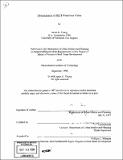| dc.contributor.advisor | Tod McGrath. | en_US |
| dc.contributor.author | Young, James G. (James Grant), 1963- | en_US |
| dc.date.accessioned | 2005-09-26T19:06:54Z | |
| dc.date.available | 2005-09-26T19:06:54Z | |
| dc.date.copyright | 1998 | en_US |
| dc.date.issued | 1998 | en_US |
| dc.identifier.uri | http://hdl.handle.net/1721.1/28204 | |
| dc.description | Thesis (S.M.)--Massachusetts Institute of Technology, Dept. of Urban Studies and Planning, 1998. | en_US |
| dc.description | Includes bibliographical references (leaves 51-52). | en_US |
| dc.description.abstract | This paper defines and empirically examines the determinants of the premiums to net asset value (commonly referred to as franchise value) at which most office and apartment REIT stocks currently trade. Franchise value is often broadly defined as the present value which management is expected to add in terms of net revenue growth to shareholders. A more detailed definition of franchise value is presented in this paper, one which incorporates each of the characteristics that contribute to a REIT's financial success: the internal and external structural components, the human resource components, and the governance issues. Independent variables are then developed as proxies for the components of the franchise value definition, in order to examine their individual impact. These independent variables are regressed against the premiums to net asset value at which a sample of office and apartment REITs traded on December 31, 1997. The results show that regional economic conditions, measures of balance sheet strength, low overhead expense ratios, and conflict of interest mitigations are statistically significant factors which contribute to franchise value. Somewhat less significant factors include total market capitalization, regional diversification, development capabilities, and the ability to acquire properties in exchange for operating partnership units. In addition, the results verify earlier work by Wang, Erickson, Gau, and Chan which concluded that REITs with relatively higher analyst coverage and a larger following by institutional investors tend to perform better than other REIT stocks. | en_US |
| dc.description.statementofresponsibility | by James G. Young. | en_US |
| dc.format.extent | 69 leaves | en_US |
| dc.format.extent | 5473215 bytes | |
| dc.format.extent | 5480099 bytes | |
| dc.format.mimetype | application/pdf | |
| dc.format.mimetype | application/pdf | |
| dc.language.iso | en_US | |
| dc.publisher | Massachusetts Institute of Technology | en_US |
| dc.rights | M.I.T. theses are protected by copyright. They may be viewed from this source for any purpose, but reproduction or distribution in any format is prohibited without written permission. See provided URL for inquiries about permission. | en_US |
| dc.rights.uri | http://dspace.mit.edu/handle/1721.1/7582 | |
| dc.subject | Urban Studies and Planning | en_US |
| dc.title | Determinants of REIT franchise value | en_US |
| dc.title.alternative | Determinants of real estate investment trust franchise value | en_US |
| dc.type | Thesis | en_US |
| dc.description.degree | S.M. | en_US |
| dc.contributor.department | Massachusetts Institute of Technology. Department of Urban Studies and Planning | en_US |
| dc.identifier.oclc | 42369199 | en_US |
